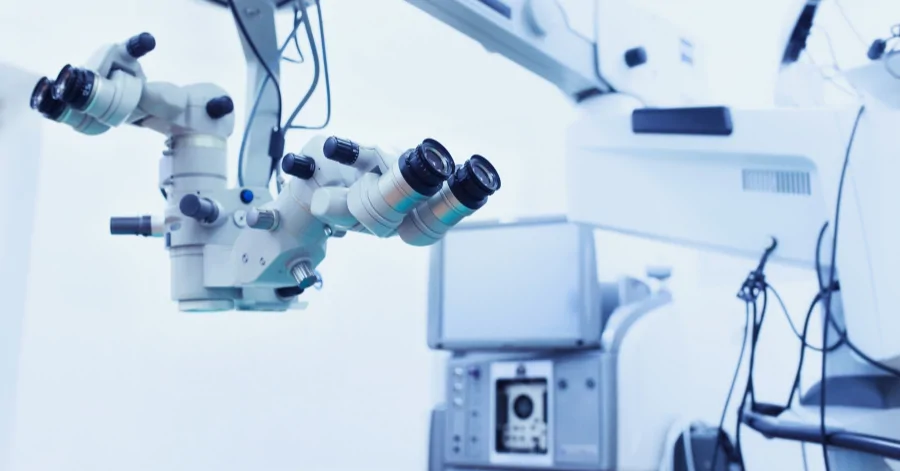With the pharmaceutical sector known for being slow at embracing digitalisation and other industry 4.0 initiatives, is the sector finally catching up? Our experts Floris Peereboom and Michiel Holtkamp look at the changes and opportunities coming within Life Sciences.
Despite being dependent on technological advances and emerging research, the pharmaceutical industry has been strangely slow to fully embrace the kind of digital transformation that businesses in other sectors have been benefitting from for the last few years. But that could all be changing as Industry 4.0 finally comes calling for the pharma supply chain.
What does this mean for the future of pharma businesses and those working within the industry?
Introducing Industry 4.0
Industry 4.0 refers to the integration of advanced digital technologies, automation, and data exchange in various sectors, including manufacturing and supply chain operations. This can range from introducing cloud computing to AI technologies and has slowly been infiltrating business operations over the last ten years.
With a widespread definition, there are of course many ways that industry 4.0 technologies are already in use for those working in pharma. Autonomous robotics in manufacturing and supply chain are hardly new and post-covid, it would be hard to find many businesses who haven’t already embraced cloud computing.
But a full digitalization takeover has been long coming, and it’s time now for pharma to fully embrace the efficiencies and process improvements that can overcome supply chain challenges and avoid shortages and hold-ups that we’ve faced in recent times.
How can digitalization help?
One of the most complex challenges in pharmaceutical supply chains comes from the necessarily high regulatory standards and different regional requirements from multiple stakeholders, combined with the international sources and providers of raw materials.
This results in lengthy and circuitous supply chains that are difficult to manage at the best of times – and open to massive and lasting disruption through global events as seen in recent years with the pandemic, the Russia/Ukraine war and even cyber-attacks on businesses.
Something as simple as a delayed shipment can have knock-on effects resulting in disproportionate capacities of raw materials, wasted products and impacted efficiencies.
Digital solutions such as platforms that allow for real-time data monitoring and end-to-end visibility allow for both high levels of visibility across the entire supply chain plus the agility to respond to supply issues at pace.
Constant algorithmic adjustments can be made to calculate the best processes, identify inefficiencies and transform processes to reduce lead times and minimize cost, while AI solutions are able to analyse and implement these faster and more reliably than human controllers.
Gisli Herjolfsson, CEO of Controlant – a digital transformation company credited with helping to savely deliver more than 5 billion Covid 19 vaccines – said:
“If you want to actually create an automated data delivery process within pharma, the first thing you need to make sure is that you have trustworthy, accurate, and 100% complete and validated data.”
Why is the digitalization of Pharmaceuticals happening now?
A report in the International Journal of Pharmaceutics in 2021, titled “Industry 4.0 for pharmaceutical manufacturing: Preparing for the smart factories of the future”, highlighted the need for the sector to evolve, citing the potential for a “well-controlled, hyper-connected, digitized ecosystem and pharmaceutical value chain for the manufacturer”.
The key thing about industry 4.0 processes is that the best results come from implementing solutions across the entire chain, not through a partial or conservative approach.
We’ve already seen steps taken through necessity as a result of the covid-19 pandemic. Before 2020 companies were already looking into these, but few were fully embracing it.
“The pharmaceutical industry has a reputation as being risk averse to embracing new technologies and spent many years in “watch and wait” mode regarding artificial intelligence (AI). Compared to other industries, pharma has been slow to adopt AI, but there has been increased activity over the past few years,” says a GlobalData case study titled “Use of Artificial Intelligence in Pharmaceutical Supply Chains, Sales and Marketing”.
But the sector can no longer afford to be slow to adopt new solutions. 2021 saw a 74% increase in pharmaceutical supply disruption, and businesses are still struggling to bounce back from that impact, let alone look towards the future. With ongoing global conflicts and a growing threat of cyber attack, the industry’s attention has finally turned.
What opportunities does this provide?
As a specialist recruitment and staffing company within the pharmaceutical industry, we follow all developments within the sector so we can best foresee the upcoming staffing needs of our clients.
Implementing new processes creates exciting new opportunities as well as new challenges. Pharmaceutical businesses are now finding themselves searching for specialists in positions that previously didn’t exist – and those skills are now highly sought after.
Our staffing specialists are in prime position to find these professionals, understanding both the world of pharmaceuticals and the skills required for digitalization across businesses. Jobs created by introducing Industry 4.0 can be as varied as:
- Data Scientists/Analysts: With the increasing availability of data from various sources, including clinical trials, patient records, and real-world evidence, there is a growing demand for data scientists and analysts. These professionals are responsible for collecting, cleaning, analyzing, and interpreting large datasets using advanced analytics techniques. They play a crucial role in extracting insights, identifying patterns, and supporting data-driven decision-making in areas such as drug discovery, clinical trials, and personalized medicine.
- Digital Health Specialists: The rise of digital health technologies, including mobile health applications, wearable devices, and telemedicine, has created a need for digital health specialists. These professionals understand the intersection of healthcare and technology and can navigate the complexities of implementing digital health solutions. They work on developing and managing digital health platforms, ensuring data privacy and security, and optimizing the use of technology for remote patient monitoring, telehealth consultations, and patient engagement.
- Artificial Intelligence (AI) and Machine Learning (ML) Experts: The application of AI and ML in pharmaceuticals requires professionals with expertise in these domains. AI/ML experts develop and deploy algorithms and models to extract insights from data, automate processes, and enable predictive analytics. They work on tasks such as drug discovery, target identification, adverse event detection, and clinical trial optimization. These professionals play a critical role in leveraging AI and ML to improve efficiency, accuracy, and decision-making in the pharmaceutical industry.
- Cybersecurity and Data Privacy Experts: With the digitization of data, ensuring the security and privacy of sensitive information becomes crucial. Cybersecurity and data privacy experts work on protecting pharmaceutical companies' digital infrastructure, systems, and data from cyber threats and breaches. They implement security measures, conduct risk assessments, develop data privacy policies, and ensure compliance with regulations like HIPAA and GDPR. These professionals play a vital role in safeguarding patient data and maintaining the integrity of digital systems.
- IT Infrastructure and Integration Specialists: As pharmaceutical companies adopt digital technologies, there is a need for professionals who can manage and optimize the IT infrastructure. These specialists work on designing and implementing robust IT systems, integrating various software applications, and ensuring seamless connectivity between different platforms. They also provide technical support, troubleshoot issues, and stay updated with emerging technologies relevant to the pharmaceutical industry.
Get in touch with our pharmaceutical staffing specialists to learn more about how we can support you through the transformation of your business and source supply chain professionals that will set you up for strong growth in the future.







